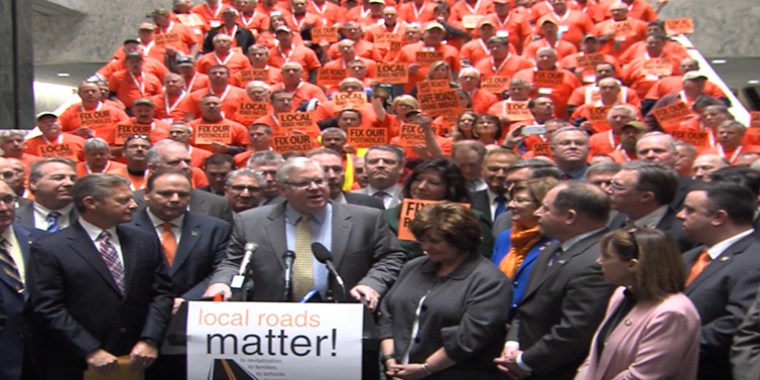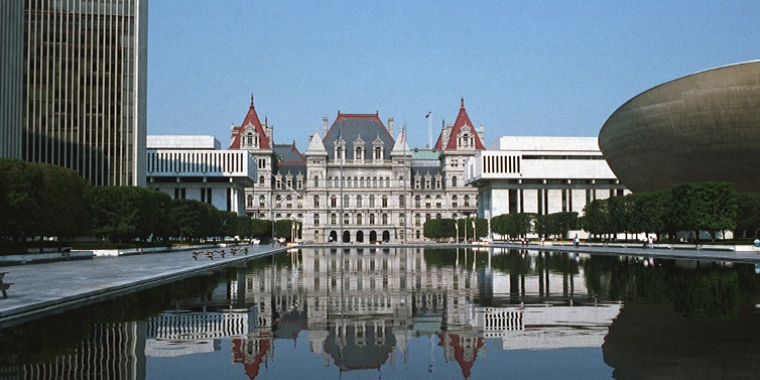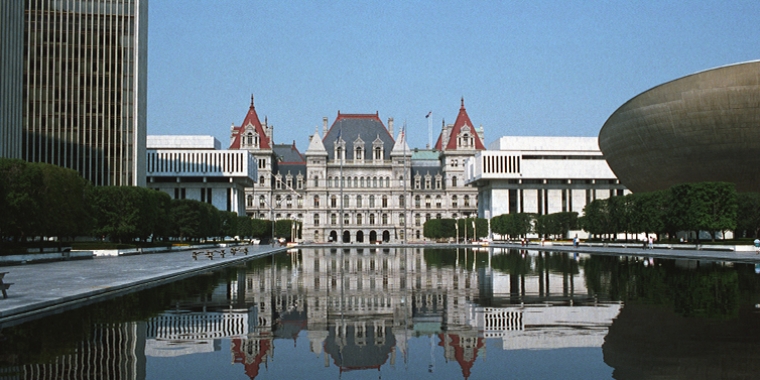
O’Mara highlights final budget's inclusion of stronger state commitment to local transportation and water infrastructure: New plan also increases aid for education, agriculture, direct service professionals, and to combat heroin
April 10, 2017
-
ISSUE:
- New York State budget

Albany, N.Y., April 10—State Senator Tom O’Mara (R-C, Big Flats) today said that among the key highlights of the 2017-2018 New York State budget are stronger state commitments local water quality infrastructure, and local roads and bridges.
O’Mara said that this year’s final budget, which was given final approval by the Senate last night, also rejects millions of dollars in new taxes and fees proposed by Governor Andrew Cuomo earlier this year.
“In keeping with many of the Senate’s overriding goals, the new state budget renews and revitalizes New York State’s commitment to local job growth, local tax relief, local environments, local infrastructure, and local community safety and development,” said O’Mara, a member of the Senate Finance Committee. “It also strengthens our ongoing commitment to addressing the heroin and opioid crisis.”
The Senate returned to the state Capitol yesterday to complete action on an approximately $153-billion state budget for New York’s 2017-18 fiscal year.
O’Mara, a member of the Senate Task Force on Heroin and Opioid Addiction, said the budget includes nearly $215 million to continue to enhance the state’s heroin and opioid addiction prevention, treatment, recovery, and education services. He said the initiatives continue to reflect input he and his colleagues have received at numerous local public forums they have conducted since 2014.
O’Mara, Chair of the Senate Environmental Conservation Committee, said the budget includes the state’s largest-ever investment, more than $2.5 billion, for water quality initiatives. Critical funds are being provided for many different types of water quality projects, including increased direct aid to localities undertaking drinking water and wastewater infrastructure projects. The budget also establishes a Drinking Water Quality Institute, first proposed by the Senate earlier this year, comprised of public health experts, scientists, water purveyors, and the commissioners of state departments of Health and Environmental Conservation.
Additionally, the budget continues to fully fund the state’s Environmental Protection Fund (EPF) at $300 million. The EPF supports critical local environmental initiatives including clean air and water projects that help create local jobs. O’Mara said that studies have shown that for every dollar of EPF funds invested in land and water protection, the state and localities get back seven dollars in economic benefits.
The budget also includes a $65-million increase in funding for the Consolidated Highway Improvement Programs (CHIPS), the main source of state aid for local roads, bringing total CHIPS funding to a record $503 million. A $50-million increase is included for the BRIDGE-NY program, with $20 million of that amount dedicated to culvert improvement projects. O’Mara and Assemblyman Phil Palmesano (R,C,I-Corning) have led the “Local Roads Matter” campaign within the Legislature over the past several years. This year they organized a bipartisan group of 137 senators and members of the Assembly, nearly 65% of the Legislature’s total membership, who recently joined county and town highway superintendents and other local leaders from throughout the state to call for increased support for local roads, bridges and culverts. Since 2013, including this year, CHIPS funding has increased by more than $200 million, or upwards of 40%. They noted that local roads and bridges account for 87% of the roads, 52% of the bridges, and 48% of the vehicle mileage logged in New York State.
O’Mara said that other budget highlights of the Senate budget include:
> significant reforms to the state’s workers’ compensation system to help businesses, local governments and not-for-profits achieve savings. The measures, including savings for employers and increased protections for injured employees, will make it more affordable to do business in New York, with employers expected to see savings this year in the form of rebates and hundreds of millions of dollars more in ongoing annual savings on premium costs after reforms are implemented;
> approximately $55 million to compensate direct service professionals (DSPs) for the important work they do to support people with disabilities including autism, serious brain injury, cerebral palsy, Down syndrome, and other developmental disabilities;
> an overall 4.4%, or $1.1-billion increase in state aid to public schools, bringing total state aid to education to a record level of funding of roughly $26 billion;
> a tax credit of up to $5,000 to farmers who donate fresh produce to food banks and other emergency food providers, commonly known as the “Farm to Food Bank” initiative which O’Mara has consistently co-sponsored and that has been approved by Legislature but vetoed by the governor for the past two years;
> authorizing to allow ride-sharing services like Uber and Lyft to operate in upstate New York State communities;
> providing a record-high level of Tuition Assistance Program (TAP) funding, more than $1.1 billion this year, to help more than 25,000 additional students better afford the cost of a college education;
> restoring an estimated $10 million in agricultural program funding cuts proposed by Cuomo this year. Since 2011, O’Mara, a member of the Senate Agriculture Committee, said that the Senate GOP has initiated budget restorations and funding for new programs totaling more than $40 million over the past several years. Among other programs and institutions the governor has proposed to cut or eliminate funding for are the Wine and Grape Foundation, Farm-to-Seniors Assistance, Tractor Rollover Prevention Program, FarmNet (Farm Family Assistance), Local Fair Assistance, and the Cornell Diagnostic Lab along with other vital Cornell research and study programs invaluable to the dairy industry among other critical agricultural challenges including food safety research and study, disease detection and prevention, honeybee die-off, invasive species, pesticide use, and rabies prevention and treatment; and
> lifting the current cap on the number of state farms which can receive licenses to grow and manufacture hemp. Since 2014, O’Mara has worked closely with Southern Tier Assemblywoman Donna Lupardo (D-Endwell) to sponsor and secure the enactment of laws that have jump-started the industry’s growth in New York. Current law caps at 10 the number of farms allowed to grow and manufacture hemp. The state’s inaugural “Industrial Hemp Summit” will be held on April 18 at Cornell University.



